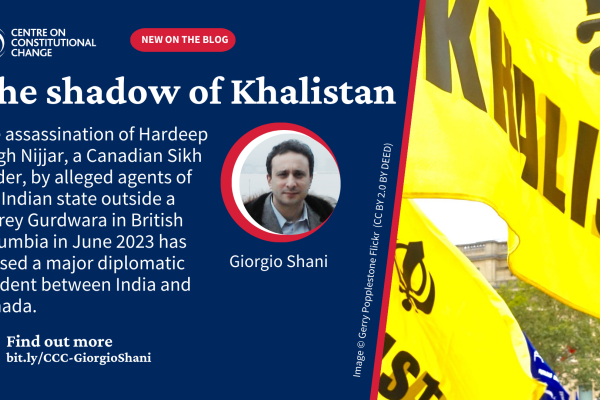The assassination of Hardeep Singh Nijjar, a Canadian Sikh leader, by alleged agents of the Indian state outside a Surrey Gurdwara in British Columbia in June 2023 has caused a major diplomatic incident between India and Canada. Niijar was a religious leader accused by India as being the chief of the banned Khalistan Tiger Force (KTF). Although he was born in the Indian state of Punjab, he was a Canadian citizen and his assassination by two unidentified gunmen with alleged links to India on Canadian soil was described by Canadian PM Justin Trudeau as an “unacceptable violation of our sovereignty.” Irrespective of alleged Indian state involvement, Nijjar’s assassination has wider implications than Indo-Canadian relations. It sheds light on the phenomenon of Sikh Nationalism in the Diaspora. As argued in Sikh Nationalism: From a Dominant Minority to an Ethno-religious Diaspora, the dynamics of Sikh nationalism in the diaspora are different but cannot be divorced from those in the Punjab.
The Sikh Diaspora
The Sikhs are a distinctive cultural and religious community in South Asia, with a vibrant diaspora and a territorial homeland. There are approximately 26 million Sikhs globally with the vast majority living in the Indian state of Punjab, where they form a slight majority. The Punjab is their homeland and Amritsar is the Sikh Jerusalem or Mecca where the holiest shrine, the Golden Temple, is located. Around 2 to 3 million Sikhs form a diaspora scattered throughout the world. These include settlers who migrated to the former dominions of the British Empire, including Canada, and its colonies. Many, however, were forced to flee the Punjab during the civil war which broke out between Sikh militants and the central government following the storming of the Golden Temple in Amritsar, the holiest shrine in Sikhism, by Indian troops on the orders of Indian Prime Minister Indira Gandhi in 1984. Gandhi was subsequently assassinated by her Sikh bodyguard leading to a pogrom allegedly organized by members of the ruling Indian National Congress party (INC) which claimed 3,000 lives. This gave rise to a civil war in Punjab which was crushed at the cost of an estimated 30,000 lives.
Sikh Nationalism in the Diaspora
Although ‘normalcy’ returned to the Punjab in the mid-1990s with the restoration of democratic elections, Khalistan lived on in the diaspora, particularly in multi-cultural societies such as Canada which accepted many migrants from the Punjab. Indeed, Sikhs constitute 2% of the Canadian population which is roughly the same as in India. Whereas today the main issues in the primarily agricultural Punjab are farmer suicides due to high debt burdens, the planned liberalisation of the agricultural sector which spawned the farmer protests a couple of years ago, and a drugs epidemic, the spectre of Khalistan looms large in the diaspora.
The Politics of Recognition
One reason is what Charles Taylor, a Canadian political theorist, termed the ‘politics of recognition’. Many Sikhs in the diaspora were met by direct and structural racism, particularly in the aftermath of the 9/11 attacks. Indeed, the first ‘hate crime’ committed after 9/11 was against a Sikh, Balbir Singh Sodhi, in a case of mistaken identity. A decade later, six worshippers at a Sikh temple in Oak Creek, Wisconsin were killed in another hate crime. The proliferation of hate crimes against Sikhs led to outreach efforts by organizations such as The Sikh Coalition in the US and Sikh Federation in the UK. They seek to educate the wider public about the Sikh faith and to protect the external symbols of Sikh identity, such as turbans and kirpans, small ceremonial swords. These symbols remind Sikhs that they are members not only of a religious but also a political community which claims to be sovereign: the Khalsa or ‘community of the pure’. Consequently, it is difficult to forget the homeland.
A Hindu Rashtra
A second reason is that India can no longer claim to be a secular state. The Indian state was born in the aftermath of the violent Partition of the sub-continent by the British into a Hindu-majority India and Muslim-majority Pakistan. The Sikhs were caught in the middle. They sided with India as it claimed to be secular but many became refugees forced to flee ethnic cleansing in Pakistan. Attempts to secure a homeland within India bore fruit with the linguistic reorganisation of the Punjab.
When they sought greater autonomy within India, the central government under Indira Gandhi sought to divide the Sikh community by sponsoring militants. This backfired as they waged a violent campaign of intimidation against Hindus and members of minority Sikh sects. Finally, the state sought to crush the militants who took refuge in the Golden Temple complex. In their attempt to ‘flush them out’ Indian troops, many of them Sikh themselves, desecrated the Golden Temple killing many pilgrims. From that moment on, a significant section of the Sikh community was at war with the Indian state. Although the state finally succeeded in crushing the movement, it could no longer claim to be secular. Even the election of a Sikh Prime Minister, Manmohan Singh, could not assuage many Sikhs.
The subsequent emergence of Hindu nationalism as espoused by the ruling Bharatiya Janata Party (BJP) accentuated the consolidation of an Indian national identity around a Hindu ethnic core. Under Prime Minister Narendra Modi, India has become a Hindu state or Hindu Rasthra in which minorities are forced to assimilate or face exclusion. In such circumstances, Khalistan remains an attractive if not a realistic option for the global Sikh community.
Bio:
Giorgio Shani is Professor of Politics and International Studies at International Christian University (ICU), Japan and was recently a Visiting Professor in the Department of International Relations at the London School of Economics and Political Science (LSE). Chair of RC43 Religion and Politics of IPSA, he is author of Sikh Nationalism and Identity in a Global Age (Routledge, 2008) and co-author of Sikh Nationalism (Cambridge University Press, 2021). He can be followed on X @GiorgioShani.

